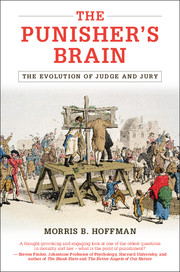Book contents
- Frontmatter
- Contents
- Acknowledgments
- Introduction
- 1 The Most Original of Original Sins
- 2 Detecting and Blaming
- 3 First-Party Punishment: Conscience and Guilt
- 4 Second-Party Punishment: Retaliation and Revenge
- 5 Third-Party Punishment: Retribution
- 6 Forgiveness and Its Signals
- 7 Delegating Punishment
- 8 Legal Dissonances
- 9 Evaluating Some Process Dissonances
- 10 Into the Gap: Evaluating Some Substantive Dissonances
- 11 Brains Punishing Brains
- Index
- References
11 - Brains Punishing Brains
Published online by Cambridge University Press: 05 May 2014
- Frontmatter
- Contents
- Acknowledgments
- Introduction
- 1 The Most Original of Original Sins
- 2 Detecting and Blaming
- 3 First-Party Punishment: Conscience and Guilt
- 4 Second-Party Punishment: Retaliation and Revenge
- 5 Third-Party Punishment: Retribution
- 6 Forgiveness and Its Signals
- 7 Delegating Punishment
- 8 Legal Dissonances
- 9 Evaluating Some Process Dissonances
- 10 Into the Gap: Evaluating Some Substantive Dissonances
- 11 Brains Punishing Brains
- Index
- References
Summary
You shall [punish] your crooked neighbor
With your crooked heart
With apologies to W. H. AudenThe Punishment Ethos
We have been punishing each other for 100,000 years. We do it because we are intensely social creatures, more tightly interconnected by far than any other genetically heterogeneous species on the planet. We do it because through those connections evolution has bequeathed us rules for group living, grounded on the importance of property and promises, and has armed us with exquisite sensitivities to when other group members violate those rules.
But of course we are both the cheaters and the cheated, the punishers and the punished. Our unmatched predisposition to cooperate with one another is just one side of natural selection’s schizophrenic coin. Yes, we cooperate, but we also cheat, because in the end it is our individual survival, and the survival of our genes, that evolution cares about, not the survival of our groups. So our brains come equipped with deeply incoherent urges – the urge to cooperate and the urge to cheat, the urge to punish cheaters and the urge to forgive them.
- Type
- Chapter
- Information
- The Punisher's BrainThe Evolution of Judge and Jury, pp. 329 - 350Publisher: Cambridge University PressPrint publication year: 2014



